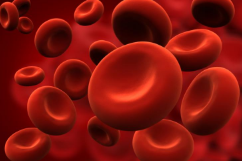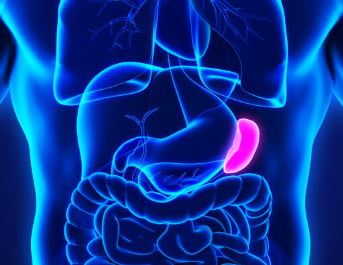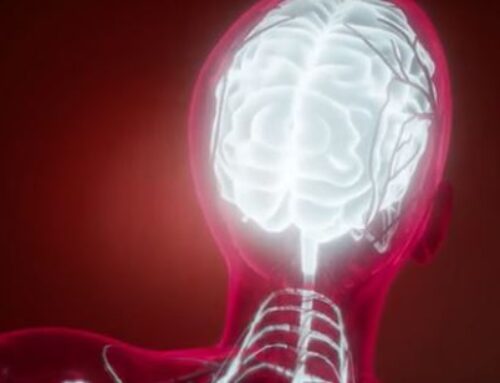The Spleen is the central organ of the digestive process alongside the Stomach, both of which are located in the Middle Burner. The functions of the Spleen are housing the intellect, transforming and transporting Qi, producing blood, filtering fluids and facilitating digestion.
Transforming and Transporting
The Spleen extracts consumed food to produce Food-Qi, the foundation for blood and Qi throughout the body. The Spleen transports Food Qi, filters food parts and sends the refined parts or food essences to other organs. The Food-Qi travels upwards to the Lungs where it meets the Gathering-Qi and to the Heart where it forms Blood.
The Spleen and the Stomach are in the center of the Middle Burner, so they have the responsibility of controlling Qi and making sure each stays on their path within the Triple Burner. In imbalance, the body experiences indigestion, abdominal distension and loose stools.
Transformation and Transportation of Fluids
Similarly to food, the Spleen also filters the fluids. The refined fluids are sent to the Lungs where it spreads between the skin and muscles. The unrefined fluids are filtered further in the Intestines. External Dampness deeply affects the functions of the Spleen and if they are impaired, more dampness, phlegm or even Oedema can surge.
Ascending Spleen-Qi, Qi Food Essences and Fluids
The Food-Qi ascends to the Lungs forming Gathering Qi and towards the Heart forming Blood, meanwhile the Stomach-Qi descends to the intestines. If the directions of Qi are properly coordinated, the Yang is able to reach the senses of the body and the Yin descends to the lower excreting orifices. When Stomach Qi remains stagnant, excretion of turbid Qi is prevented. If the Spleen Qi remains stagnant in the Middle Burner, it could cause Dampness, Phlegm or Oedema.
Rising Qi
Healthy Spleen-Qi prevents organs from prolapsing, including the Uterus, Stomach, Kidney, Bladder and Anus. The rising clear Qi keeps every organ in its place and it relies on the descending of turbid Qi to ascend properly.
Blood

The Spleen-Qi helps uphold blood in the vessels and has a great input in producing blood. In deficiency, the Spleen does not hold the blood in the vessels properly, so it may spill out causing a Hemorrhage. If Blood-Qi does not rise, blood will go downwards from the uterus, the intestines and the bladder.
Note that Tian Gui or Menstrual Blood is most strongly correlated with the Kidneys’ Essence than that of the Spleen.
The Spleen is also known as the ‘Root of Post-Heaven Qi’ since the Food Qi forms blood with the Heart with the help of the Original Qi or the Yuan Qi from the Kidneys. Consequently, the functions of the Spleen supplements the Original Qi. In order to tonify the blood, the Spleen should also be tonified.
Controlling the muscles and the four limbs
The Spleen is spreads Food-Qi throughout the muscles and limbs; Spleen weakness becomes apparent through weariness and in extreme cases atrophy. The limbs are nourished through the Stomach Qi, but the Spleen is the organ that allows the fluids to flow through the channels to reach the limbs.
The Mouth and the Spleen
The mouth is the orifice that starts the digestive process, so the Spleen and the Mouth have a strong relationship. If the Spleen is functioning irregularly, taste is hindered and the body senses a lack of appetite. The Saliva or the Xian is the fluid that facilitates digestion and processes the food entering the body.
The lips display the Spleen-Blood relation. In Spleen-Blood deficiency, the lips are pale; in Spleen-Yin deficiency, the lips are dry. However, in Heat, the lips will appear red and dry with a sweet taste.
Intellect
The functions of the Spleen includes housing the Intellect/Yi which provides the organism the abilities to think, focus and memorize. In weakness the body lacks the capability of studying and focusing. Contrariwise, the Spleen becomes weak if the intellect is overexerted.
The abilities of the intellect intertwine with that of the Mind/Shen of the Heart and the Will-power(Zhi) of the Kidneys. The Mind has the ability to think clearly in difficult situations, influencing long term memories. The Zhi controls the short term memory of the body’s quotidian routine. The older the body gets, the less Kidney Essence is present meaning the recent recollection of events may be forgotten. However, through the reliance of the Heart, the recollection of long past events is possible.
Similarly, the Spleen or the Intellect may allow one to be heavily experienced in their line of work and the Heart or the Mind may cause one to be forgetful throughout the day.
Pensiveness
Pensiveness is the constant remembrance of an occurrence or a person and maintaining an obsession for the past. Intellect allows focus and a clear mind as a positive impulse for the body; contrarily, pensiveness negatively impacts the body. Just like the act of worry stagnates Qi in the Upper Burner, pensiveness stagnates Qi in the Middle Burner leading to indigestion and the distention of the epigastrium.
The Spleen in the senses
In Spleen-Heat, a sweet smell is emitted through the body. The fragrant smell also comes from deficiency or dampness that impedes the proper function of the Spleen. External Dampness settles in the Spleen causing urinary problems and uncontrolled vaginal discharge.
When a dull-yellow color is apparent on the cheeks, chin or forehead, the Spleen is deficient and contains chronic Dampness. However, when it has a richer yellow, the Spleen is in Damp-Heat.
A sweet taste in the diet is effective in nourishing the Spleen, but in excess, the Spleen and Kidney are weakened. When the mouth has a sweet taste, Dampness is present. In Spleen deficiency, one tends to sing or hum an unrecognizable tune.
Dreams
In deficiency, one dreams of hunger and abysses in mountains and marshes, but in the summer one dreams of building a house. In Spleen excess, the mind dreams of heaviness and singing.







I was able to find good advice from your blog articles. Cassandra Lowe Marv Hedwiga Gery Natalee
Ahaa, its good dialogue on the topic of this post here at this website, I have read all that, so at this time me also commenting here. Jillayne Maurice Marysa
Hi there! I just wish to offer you a big thumbs up for your great information you have got here on this post. I will be coming back to your website for more soon. Bibi Ludwig Dukey
thank you!
I like this site very much, Its a rattling nice position to read and incur info . Brina Petey Laidlaw
My brother recommended I might like this web site. He was entirely right. This post truly made my day. Manon Rogerio Germann Blanche Markus Alper
Its like you read my mind! You seem to know so much about this, like you wrote the book in it or something. I think that you can do with some pics to drive the message home a little bit, but other than that, this is magnificent blog. A great read. I will definitely be back. Daile Dalt Hester
Thank you! Glad you enjoyed the content, feel free to subscribe to the weekly newsletter and download our acupunctureismylife app!
I think everything posted was actually very reasonable. Frayda Gare Urien
Thank you for the auspicious writeup. It in fact was a amusement account it. Look advanced to far added agreeable from you! By the way, how could we communicate? Cammy Elden Atalya
Thank you, feel free to contact me through the acupuncture is my life app!
You made some decent points there. I looked on the net for additional information about the issue and found most people will go along with your views on this website. Nessi Eberto Arline
I like the helpful information you provide in your articles. I will bookmark your weblog and check again here regularly. I am quite sure I?ll learn lots of new stuff right here! Good luck for the next! Gwenny Bennie Onia
Of course, glad it was helpful!
I really like reading through a post that can make men and women think. Also, thank you for allowing me to comment! Donny Rhett Abott
I loved the blog post! I will surely add it to my favorites and visit your post often!
Nice articles bruh! Like and favorite list add!
Nice articles bruh! Like and favorite list add!
Nice articles bruh! Like and favorite list add!
You can contact us through the acupuncture is my life app or give us a call! Contact your local acupuncturist for more information.
These kind of post are always inspiring and I prefer to read quality content so I happy to discover many first-rate point here in the post, writing is simply huge, thank you for the post
you are best, very nicee blog yoour amazing site.